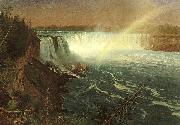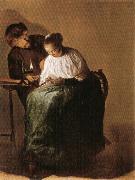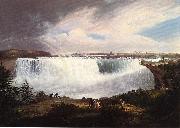Wholesale Oil Painting No Minimum |
|||||||||||
|
|
|||||||||||

|
|||||||||||
|
|
|
||||||||
Albert BierstadtGerman-born American Hudson River School Painter, 1830-1902 Bierstadt was born in Solingen, Germany. His family moved to New Bedford, Massachusetts, in 1833. He studied painting with the members of the D??sseldorf School in D??sseldorf, Germany from 1853 to 1857. He taught drawing and painting briefly before devoting himself to painting. Bierstadt began making paintings in New England and upstate New York. In 1859, he traveled westward in the company of a Land Surveyor for the U.S. government, returning with sketches that would result in numerous finished paintings. In 1863 he returned west again, in the company of the author Fitz Hugh Ludlow, whose wife he would later marry. He continued to visit the American West throughout his career. Though his paintings sold for princely sums, Bierstadt was not held in particularly high esteem by critics of his day. His use of uncommonly large canvases was thought to be an egotistical indulgence, as his paintings would invariably dwarf those of his contemporaries when they were displayed together. The romanticism evident in his choices of subject and in his use of light was felt to be excessive by contemporary critics. His paintings emphasized atmospheric elements like fog, clouds and mist to accentuate and complement the feel of his work. Bierstadt sometimes changed details of the landscape to inspire awe. The colors he used are also not always true. He painted what he believed is the way things should be: water is ultramarine, vegetation is lush and green, etc. The shift from foreground to background was very dramatic and there was almost no middle distance Nonetheless, his paintings remain popular. He was a prolific artist, having completed over 500 (possibly as many as 4000) paintings during his lifetime, most of which have survived. Many are scattered through museums around the United States. Prints are available commercially for many. Original paintings themselves do occasionally come up for sale, at ever increasing prices. |
||||||||
|
|
||||||||
Niagara
Niagara Painting ID:: 2459 |
1869
19.02 x 27.01 ins / 48.3 x 68.6 cm
Private collection 1869 19.02 x 27.01 ins / 48.3 x 68.6 cm Private collection |
|||||||
|
|
||||||||
Currier and IvesAmerican Publisher, 1834-1907 |
||||||||
|
|
||||||||
|
|
Niagara
Niagara Painting ID:: 30934 |
mk68
1857
mk68 1857 |
||||||
|
|
||||||||
Frederick Edwin Church1826-1900 Frederick Edwin Church Galleries Frederic Edwin Church (May 4, 1826 ?C April 7, 1900) was an American landscape painter born in Hartford, Connecticut. He was a central figure in the Hudson River School of American landscape painters. While committed to the natural sciences, he was "always concerned with including a spiritual dimension in his works". The family wealth came from Church's father, Joseph Church, a silversmith and watchmaker in Hartford, Connecticut.(Joseph subsequently also became an official and a director of The Aetna Life Insurance Company) Joseph, in turn, was the son of Samuel Church, who founded the first paper mill in Lee, Massachusetts in the Berkshires, and this allowed him(Frederic) to pursue his interest in art from a very early age. At eighteen years of age, Church became the pupil of Thomas Cole in Catskill, New York after Daniel Wadsworth, a family neighbor and founder of the Wadsworth Atheneum, introduced the two. In May 1848, Church was elected as the youngest Associate of the National Academy of Design and was promoted to Academician the following year. Soon after, he sold his first major work to Hartford's Wadsworth Atheneum. Church settled in New York where he taught his first pupil, William James Stillman. From the spring to autumn each year Church would travel, often by foot, sketching. He returned each winter to paint and to sell his work. Between 1853 and 1857, Church traveled in South America, financed by businessman Cyrus West Field, who wished to use Church's paintings to lure investors to his South American ventures. Church was inspired by the Prussian explorer Alexander von Humboldt's Cosmos and his exploration of the continent; Humboldt had challenged artists to portray the "physiognomy" of the Andes. |
||||||||
|
|
||||||||
|
|
Niagara
Niagara Painting ID:: 31889 |
mk77
1857
Oil on canvas
42 1/4x990 1/2in
mk77 1857 Oil on canvas 42 1/4x990 1/2in |
||||||
|
|
||||||||
Louis Remy MignotFeb.3.1831-Sep.22.1870 |
||||||||
|
|
||||||||
|
|
Niagara
Niagara Painting ID:: 39076 |
mk140
1866
Oil on canvas
123.8x232.4cm
mk140 1866 Oil on canvas 123.8x232.4cm |
||||||
|
|
||||||||
Frederick Edwin Church1826-1900 Frederick Edwin Church Galleries Frederic Edwin Church (May 4, 1826 ?C April 7, 1900) was an American landscape painter born in Hartford, Connecticut. He was a central figure in the Hudson River School of American landscape painters. While committed to the natural sciences, he was "always concerned with including a spiritual dimension in his works". The family wealth came from Church's father, Joseph Church, a silversmith and watchmaker in Hartford, Connecticut.(Joseph subsequently also became an official and a director of The Aetna Life Insurance Company) Joseph, in turn, was the son of Samuel Church, who founded the first paper mill in Lee, Massachusetts in the Berkshires, and this allowed him(Frederic) to pursue his interest in art from a very early age. At eighteen years of age, Church became the pupil of Thomas Cole in Catskill, New York after Daniel Wadsworth, a family neighbor and founder of the Wadsworth Atheneum, introduced the two. In May 1848, Church was elected as the youngest Associate of the National Academy of Design and was promoted to Academician the following year. Soon after, he sold his first major work to Hartford's Wadsworth Atheneum. Church settled in New York where he taught his first pupil, William James Stillman. From the spring to autumn each year Church would travel, often by foot, sketching. He returned each winter to paint and to sell his work. Between 1853 and 1857, Church traveled in South America, financed by businessman Cyrus West Field, who wished to use Church's paintings to lure investors to his South American ventures. Church was inspired by the Prussian explorer Alexander von Humboldt's Cosmos and his exploration of the continent; Humboldt had challenged artists to portray the "physiognomy" of the Andes. |
||||||||
|
|
||||||||
|
|
Niagara
Niagara Painting ID:: 42771 |
MK169
1857
oil Paint on cloth
108x230cm MK169 1857 oil Paint on cloth 108x230cm |
||||||
|
|
||||||||
Louis Remy MignotFeb.3.1831-Sep.22.1870 |
||||||||
|
|
||||||||
|
|
Niagara
Niagara Painting ID:: 72687 |
ca. 1866(1866)
Oil on canvas
123.8 X 232.4 cm (48.74 X 91.5 in)
cjr ca. 1866(1866) Oil on canvas 123.8 X 232.4 cm (48.74 X 91.5 in) cjr |
||||||
|
|
||||||||
Louis Remy MignotFeb.3.1831-Sep.22.1870 |
||||||||
|
|
||||||||
|
|
Niagara
Niagara Painting ID:: 74449 |
Date ca. 1866(1866)
Medium Oil on canvas
Dimensions 123.8 X 232.4 cm (48.74 X 91.5 in)
cyf Date ca. 1866(1866) Medium Oil on canvas Dimensions 123.8 X 232.4 cm (48.74 X 91.5 in) cyf |
||||||
|
|
||||||||
Alvan FisherAmerican Painter, 1792-1863, American painter. Soon after he left the tutelage of John Ritto Penniman (c. 1782-1841), he began to paint genre landscapes such as Winter in Milton, Massachusetts (1815; Montclair, NJ, A. Mus.), which depicts a man on a horse-drawn sleigh enjoying the beauty of a fresh New England snowfall. |
||||||||
|
|
||||||||
|
|
Niagara
Niagara Painting ID:: 75747 |
Dates: 1820
Dimensions: 87.2 cm x 122 cm
Medium: Painting - oil on canvas
cyf Dates: 1820 Dimensions: 87.2 cm x 122 cm Medium: Painting - oil on canvas cyf |
||||||
|
|
||||||||
|
Alvan Fisher American Painter, 1792-1863, American painter. Soon after he left the tutelage of John Ritto Penniman (c. 1782-1841), he began to paint genre landscapes such as Winter in Milton, Massachusetts (1815; Montclair, NJ, A. Mus.), which depicts a man on a horse-drawn sleigh enjoying the beauty of a fresh New England snowfall. Niagara Dates: 1820 Dimensions: 87.2 cm x 122 cm Medium: Painting - oil on canvas cyf |
||||||||
|
|
||||||||
|
Prev Next
|
||||||||
|
|
||||||||
|
Related Paintings to Alvan Fisher :. |
||||||||
|
|
||||||||
|
CONTACT US |








